Revitalize Your Skin: Top Essential Oils for Skincare and How to Use Them
Essential Oils for Skincare
Essential oils, and the benefits that come along with them, are a secret held by many for healthy skin. Even if you don’t directly incorporate essential oils into your skincare yet, you may be surprised to see just how many oils are in the everyday products you do already use. Moisturizers, serums, cleansers, and even some cosmetic products take full advantage of essential oils and the benefits they have to offer.
Exploring the best essential oils for skincare may be your answer. This informative guide explores potent essential oils, detailing their benefits for common skin concerns and safe application methods to elevate your skincare routine.
What to Focus On When Looking for the Best Essential Oils for Skincare:
- Essential oils offer natural skincare solutions with benefits such as acne treatment, wrinkle reduction, moisturization, and anti-inflammatory properties; when applied, they absorb quickly, enhancing both the physical appearance and psychological well-being.
- Some of the most popular and best essential oils for skin are lavender, rose geranium, team tree, ylang ylang, frankincense, and chamomile.
- It’s critical to select the appropriate carrier oil based on skin type and concerns, with a proper understanding of dilution ratios to safely use essential oils; combining essential oils with compatible carrier oils enhances benefits and ensures safe application.
- Essential oils can be tailored to address specific skin concerns for various skin types, including normal, sensitive, oily, acne-prone, and mature skin; they provide targeted solutions and can be combined into unique DIY skincare recipes for personalized care.
Unlocking the Power of Essential Oils for Skincare

Derived from nature’s flora, essential oils are the essence of plants captured in concentrated form. Owing to their botanical origins, these oils offer a natural and effective solution to a multitude of skin concerns, making them a worthy addition to any skincare routine. But what makes essential oils such a skin elixir? It’s their unique properties that target skin issues at their core, offering benefits like:
- treating acne
- reducing wrinkles
- moisturizing dry skin
- possessing antibacterial and anti-inflammatory properties
- astringent properties
The importance of using pure essential oils cannot be overstated, especially for their soothing, calming properties and their ability to visibly restore the skin’s appearance. Pure essential oils, when used at a lower dilution, are particularly suitable for sensitive and delicate skin types, highlighting their versatility and efficacy in skincare.
When applied to the skin, essential oils are quickly absorbed, delivering their healing properties straight to your skin cells. This absorption, coupled with their soothing and protective properties, makes essential oils a valuable addition to cosmetics and skincare products. Whether you’re looking to enhance your cleaning routine or desire to relax your senses, essential oils can provide a holistic approach to skincare that transcends mere surface-level benefits, promoting both physical and psychological well-being.
Lavender Essential Oil
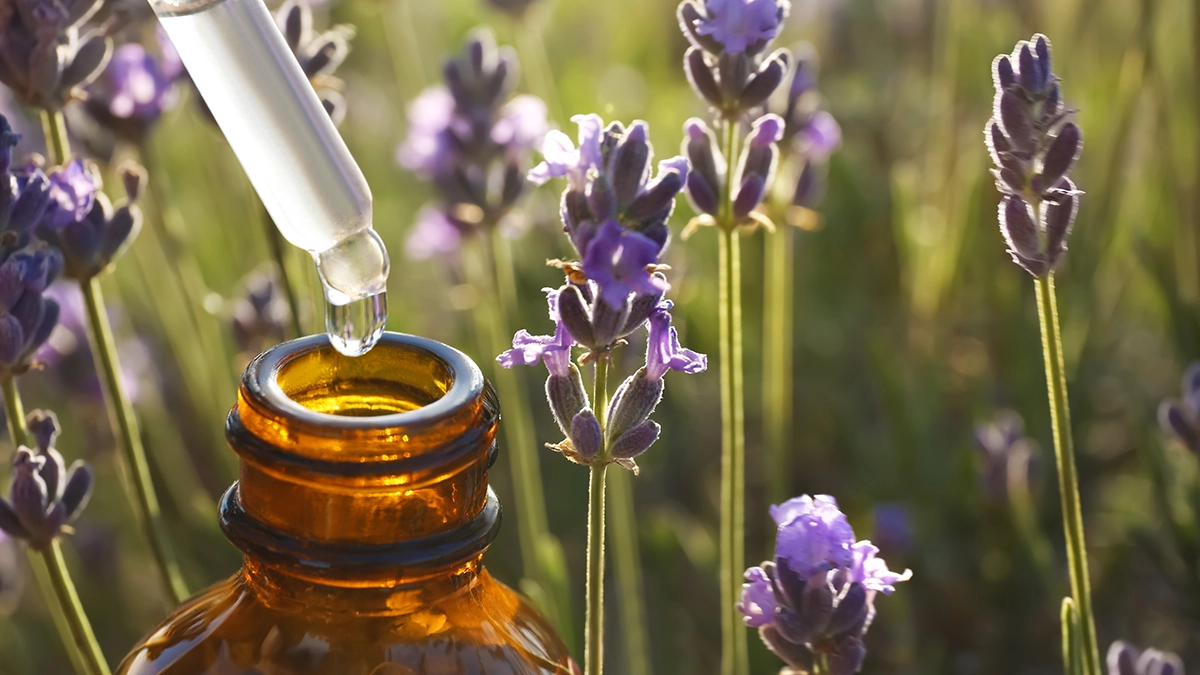
Lavender is an all-around necessity in the essential oil world. For skin, its key benefits include cleansing and helping to heal skin irritations or broken skin. For instance, if you’ve recently experienced a breakout, and you’ve picked at your skin knowing you shouldn’t but did anyway, lavender essential oils can help to speed up the healing of your skin while keeping the surface clean. Lavender isn’t only for the face, and its healing properties can be used just about anywhere on the body you wish to soothe skin and minimize scarring.
Lavender also helps the skin in another way, and that’s through sleep. It’s no secret that a good night’s rest can work wonders on your skin, and lavender can help to soothe the body and the mind to welcome in restful sleep. Simply take lavender essential oils, place them in the nebulizing diffuser of your choice, and allow the aroma to take you away.
Lavender essential oil, known for its calming scent, is a skincare powerhouse. This oil’s properties make it an excellent choice for skincare, especially for:
- Soothing the skin
- Promoting a healthier complexion
- Reducing redness and inflammation
- Providing relief for various skin conditions
For normal skin, lavender oil’s soothing properties improve the overall skin condition, nurturing healthy and radiant skin. Moreover, this versatile oil is also a boon for mature skin. By promoting cell regeneration and tissue repair, lavender oil can enhance the skin’s texture and tone, making it an ideal ingredient for anti-aging skincare routines.
Tea Tree Oil
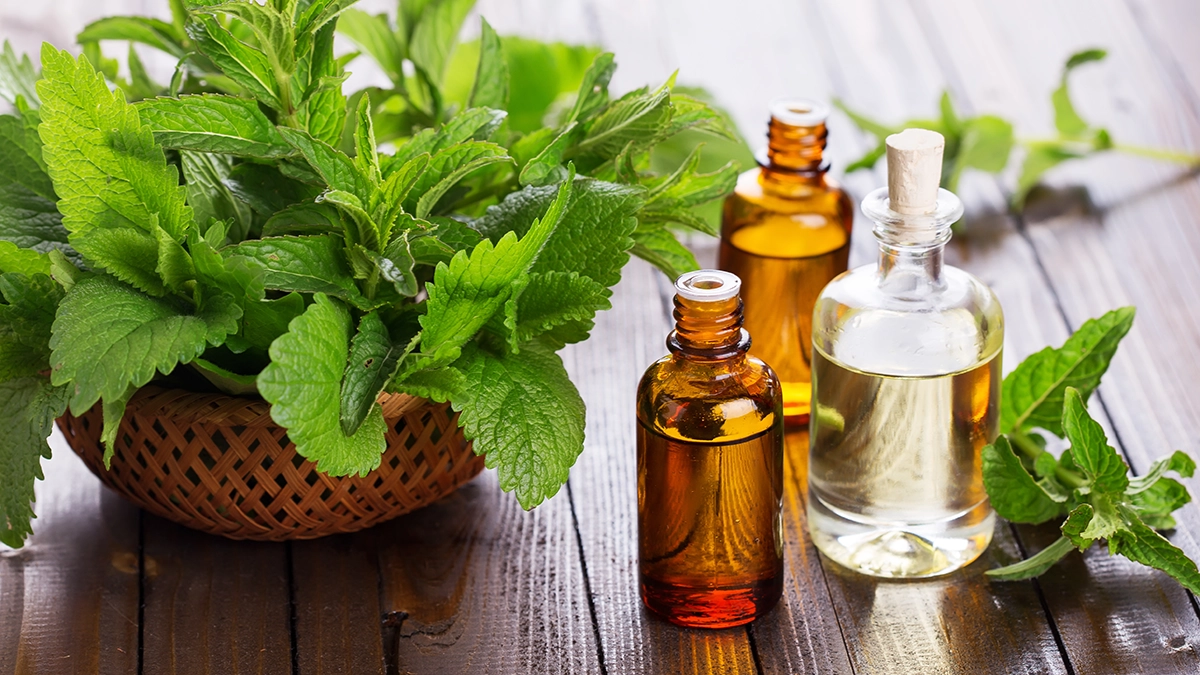
Next up is tea tree oil, a potent remedy for acne-prone skin. Renowned for its powerful antibacterial and antifungal properties, tea tree oil can effectively target acne by reducing oil production on the skin and controlling microbial presence.
In addition to its therapeutic properties, tea tree oil is also versatile in terms of its incorporation into homemade skincare routines. A simple face wash containing:
- coconut oil
- honey
- apple cider vinegar
- probiotics
- a few drops of tea tree oil
can offer a gentle yet effective solution for keeping acne at bay.
Geranium Oil

When it comes to balancing the skin’s oil production, geranium essential oil takes center stage. This oil is not only beneficial for those with oily or combination skin types but is also known for its ability to balance skin’s oil production, reduce skin inflammation, leading to a calmer and more even complexion.
Furthermore, geranium oil is also prized for its role in improving overall skin tone and texture. With its potent anti-aging properties, this essential oil enhances skin elasticity, minimizes the appearance of wrinkles and fine lines, and promotes cell regeneration, making it a popular choice in anti-aging skincare products.
Rose Geranium is the great balancer, and this is exactly how it works to improve your skin. Whether you overproduce oil, leaving you with oily and breakout prone skin, or you under produce oil, leaving you dry and more susceptible to the signs of aging, rose geranium essential oil can help. Because of its balancing properties, rose geranium essential oil works beautifully for all skin types, and it can be added to moisturizers to keep your skin balanced in seconds.
Frankincense Oil
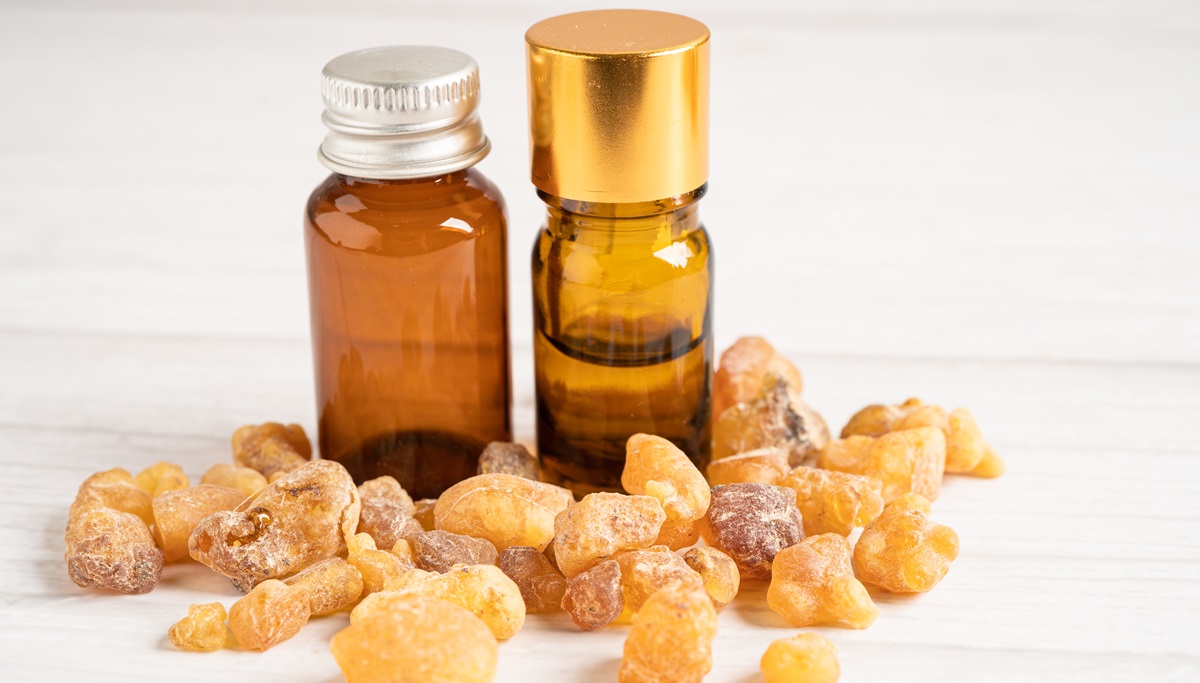
Frankincense essential oil, often referred to as the ‘king of essential oils’, is well-regarded for its anti-aging effects. This oil works as a skincare elixir by promoting skin cell regeneration, reducing inflammation, and diminishing the appearance of fine lines and wrinkles.
Frankincense oil’s astringent properties can help in:
- lifting sagging skin
- supporting the process of cellular renewal
- repairing damage from scars
- reducing wrinkles
- enhancing skin tone
This makes frankincense oil especially recommended for mature skin, making your skin look agelessly beautiful.
Ylang Ylang Essential Oil
Acne is typically treated as an adolescent problem, which leaves adult acne sufferers frustrated and without the products they need to care for their skin. An estimated 60 million Americans suffer from acne, and 20% of that 60 million are adults of all ages. What ylang ylang provides to skin is a way to treat the signs of aging and acne at the same time. Normally, acne products focus on lowering oil production and clearing the skin through drying, which can leave aging skin even more susceptible to succumbing to the signs of aging. Ylang ylang, however, helps to treat acne conditions while simultaneously stimulating cell growth and fighting aging and skin damage.
Lemongrass Essential Oil
Lemongrass also helps to treat acne by clearing current breakouts, but it also takes care of those past acne marks as well. One of the most frustrating parts of suffering from acne is that even when the current blemishes have gone away, they leave in their wake ghosts of themselves in the form of dark marks and post-acne scars. Lemongrass not only helps to clear acne and large pores, it gives skin a healthy glow while speeding up the removal of post acne marks.
Chamomile Essential Oil
Like lavender, chamomile is well known to calm, soothe, and comfort irritated skin. Eczema, inflammation, rosacea, bug bites, and rashes can all be soothed by incorporating chamomile into your skincare regimen. One really popular way to soothe skin and soothe the senses is by adding a couple drops of chamomile essential oils to a warm bath. For itchy and dry winter skin, adding some chamomile to an oatmeal bath can provide the relief you’ve been looking all season for.

Carrier Oils: The Perfect Partners for Essential Oils
While essential oils are the stars of the show, carrier oils play an equally important role in your skincare routine. Extracted from various botanical sources, carrier oils are known for their skin-beautifying benefits and are essential for diluting essential oils before application.
Jojoba oil, for instance, is a popular carrier oil for oily skin, recognized for its protective and cleansing properties. This highlights the importance of choosing the right carrier oil, which complements the essential oil, to reap optimal skincare benefits.
The Best Carrier Oils: Rosehip

Rosehip oil, extracted from the seeds of wild rose bushes, is another hero in the realm of skincare. This oil is renowned for reducing wrinkles and fine lines, diminishing redness and irritation, as well as lightening dark spots.
Rosehip oil’s deeply nourishing properties make it particularly beneficial for dry, dehydrated, or aging skin. You can even create a hydrating face oil by combining rosehip oil with other nourishing oils such as jojoba oil, argan oil, and essential oils like Vitamin E, carrot seed, and geranium, promising a radiant and youthful look.
Choosing the Right Carrier Oil
Choosing the right carrier oil involves understanding your skin type and the specific properties of the available carrier oils. For instance, jojoba oil is suitable for sensitive skin, while apricot oil is ideal for oily complexions.
Carrier oils have specific comedogenic ratings, indicating their likelihood to clog pores. Jojoba oil and sweet almond oil both have a comedogenic rating of 2, while hemp seed oil has a rating of 0. Sweet almond oil with its emollient and anti-inflammatory properties is great for dry skin, while evening primrose oil is beneficial for dry skin and conditions like eczema. Therefore, it’s crucial to choose the appropriate carrier oil to achieve the desired skincare results.
Dilution Ratios
Understanding the appropriate dilution ratios for essential oils is crucial for their safe and effective use. For adults, a typical dilution for essential oils in carrier oils is about 2-3%, equating to roughly 12-18 drops of essential oil per ounce of carrier oil.
However, these ratios may need adjustment for sensitive individuals. For children, the elderly, or those with sensitive skin, a lower dilution of 1% or less is advised, translating to using 6 drops of essential oil per ounce of carrier oil. Similarly, for applications on the face or other sensitive areas, a lower dilution rate is recommended when you dilute essential oils.
Combining Essential Oils and Carrier Oils
Combining essential oils with carrier oils is not just about safety but also about enhancing the skincare benefits. This is because essential oils need to be diluted with a carrier oil before being applied to the skin, ensuring safe usage and optimal skincare benefits.
The art of combining these oils lies in understanding the properties of both the essential oil and the carrier oil. This allows you to create a blend that not only ensures safe use of the essential oils but also targets your specific skincare needs, be it controlling oil production, reducing inflammation, or promoting skin regeneration.
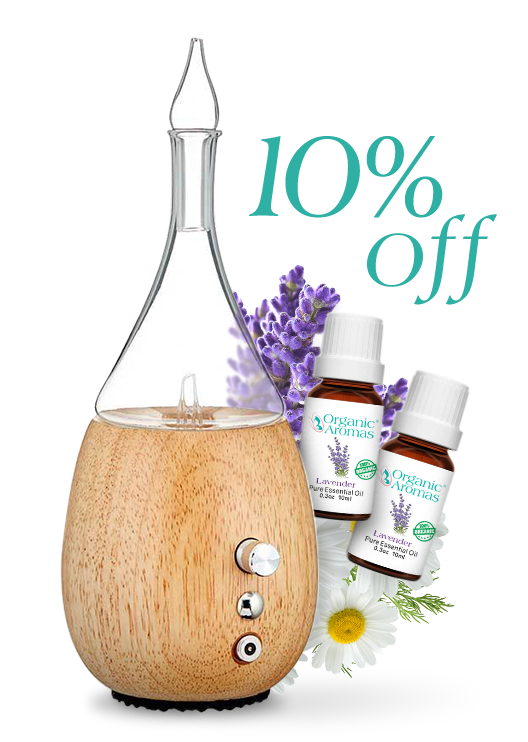
Join Now and Get a Coupon for 10% Off!
Essential Oils for Specific Skin Types and Concerns
After understanding the general benefits of essential oils and how to use them, it’s time to delve deeper into how these magical oils can be tailored to specific skin types and concerns. Whether you have:
- normal skin
- sensitive skin
- oily skin
- acne-prone skin
- mature skin
There’s an essential oil blend out there that can address your specific needs and boost the health and beauty of your skin.
Not only can essential oils provide targeted skincare solutions, but they can also be combined in unique ways to create bespoke skincare routines. Here are some essential oils and their unique benefits:
- Thyme essential oil: offers protective and purifying effects
- Lavender essential oil: soothes and calms the skin
- Tea tree essential oil: helps with acne and blemishes
Each oil can be used to cater to your skin’s specific needs and concerns, including helping to balance skin’s oil production.
Normal Skin
For those blessed with normal skin, essential oils can help maintain its balance and health. Essential oils such as chamomile, lavender, and ylang ylang are among the beneficial oils for normal skin types.
Not only do these oils help maintain a healthy skin balance, but they also enhance the overall complexion. For instance, orange essential oil promotes a radiant and smooth complexion, making it particularly beneficial for normal skin.
Meanwhile, ylang ylang oil, with its ability to maintain a healthy skin balance, is another excellent choice for those with normal skin.
Sensitive Skin
Sensitive skin requires gentle care, and certain essential oils are just right for the task. Chamomile oil, renowned for its calming properties, is especially beneficial for soothing sensitive skin and reducing redness and inflammation.
Similarly, rose oil is known for its calming effect on sensitive skin, helping to minimize redness and irritation. By incorporating these calming oils into your skincare routine, you can soothe your sensitive skin and enhance its overall health and appearance. Some calming oils to consider are:
- Lavender oil
- Chamomile oil
- Rose oil
Oily Skin
If you are struggling with oily skin, essential oils can be your best ally. Lemon and fennel essential oils are effective in controlling excess oil production without causing skin dryness. Lemon essential oil, in particular, helps normalize sebum production and tightens pores, thus improving skin texture and appearance.
Lemongrass and rosemary essential oils, with their purifying properties, aid in clearing clogged pores, making them ideal for those with oily skin. By incorporating these oils into your skincare routine, you can manage oily skin and enhance its overall health and appearance.
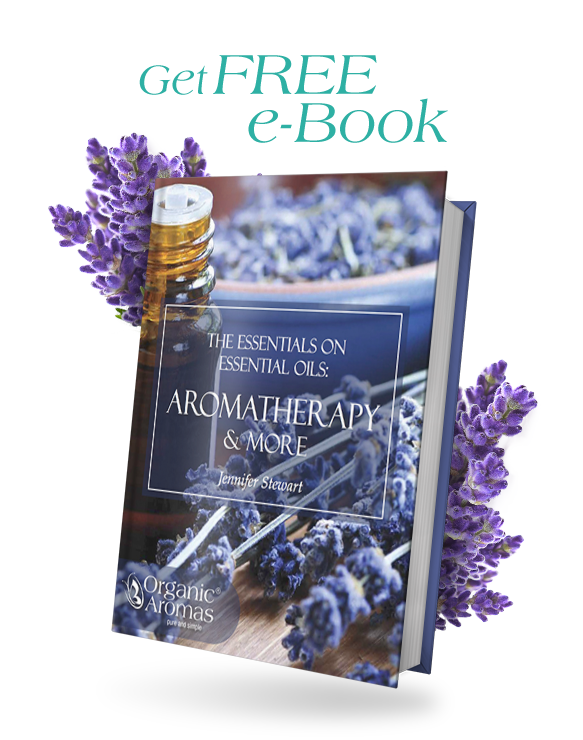
Sign Up to Get Your FREE
e-Book Here…
Acne-Prone Skin
Acne-prone skin can benefit immensely from the antibacterial properties of essential oils. Tea tree essential oil, for instance, is valued for its antimicrobial properties, making it beneficial for soothing the skin and reducing the occurrence of acne.
Argan oil, with a comedogenic rating of 0, is advantageous for those with oily and acne-prone skin, offering anti-aging benefits and improving skin elasticity without clogging pores. Other essential oils like lavender and frankincense also share antibacterial properties that are highly effective in treating acne.
Mature Skin
Mature skin requires special care, and some essential oils are particularly beneficial for this skin type. Rosehip oil, for instance, aids in skin regeneration and has a low risk of clogging pores, making it excellent for mature skin.
Rosemary essential oil, rich in antioxidants, is critical in protecting mature skin against the damage caused by oxidative stress. By incorporating these oils into your skincare routine, you can revitalize your mature skin and enhance its overall health and appearance.
Essential Oil Safety and Precautions
While the benefits of many essential oils are numerous, it’s crucial to remember that they are potent and should be used with care. Adhering to proper dilution guidelines is essential, especially for sensitive populations, to minimize adverse reactions.
For instance, for sensitive individuals such as children aged 5-10, the elderly, or those with sensitive skin, a lower dilution of 1% or less is advised. Similarly, when essential oils are applied to the face or other sensitive areas, a lower dilution rate is recommended.
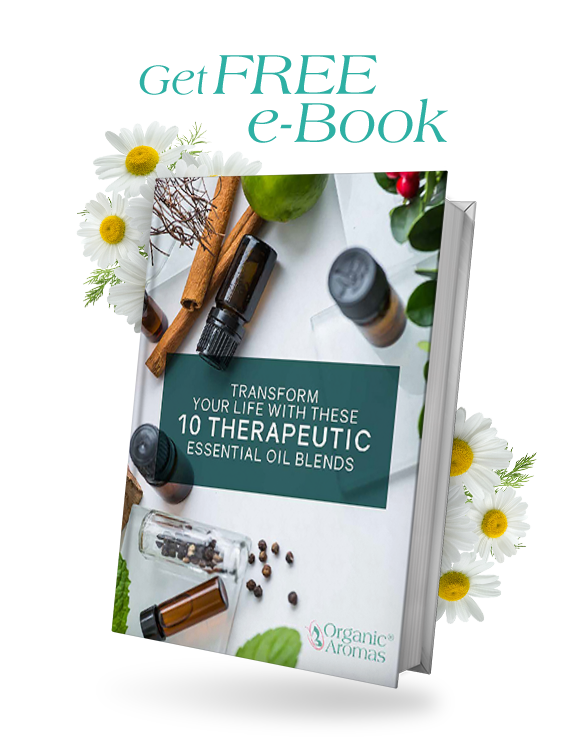
Sign Up to Get Your FREE Essential Oils e-Book Here
DIY Skincare Recipes with Essential Oils
Now that you have a good understanding of how essential oils can transform your skincare routine, why not try creating your own skincare products? The beauty of DIY skincare recipes is that you can tweak them to suit your specific skin needs.
For a start, you can create a gentle facial serum by combining 30 mL of carrier oil with 6 drops of an essential oil, applying it to freshly cleansed skin. For a hydrating post-bath treatment, try massaging a blend of 60 mL of carrier oil with 24 drops of essential oil onto your body.
For a daily moisturizer, mix 15 drops of Rose Geranium, 5 drops each of Chamomile German, Lavender, and Lemon with two tablespoons of almond oil for normal skin. You can even create a facial cleanser by incorporating 3-5 drops of essential oils into 60 mL of a mixture containing Hydrosol or Floral Water, Aloe Vera Gel Juice, and Vegetable Glycerin.
Lastly, try the exfoliating Coconut & Tea Tree Oil Face Scrub made from:
- coconut oil
- honey
- organic coffee grounds
- carrot seed oil
- tea tree essential oil
For a rejuvenating skin treatment that addresses inflamed skin.
The List of the Best Essential Oils for Skincare
In conclusion, you have seen how essential oils offer a natural, effective, and versatile approach to skincare. From treating acne to reducing wrinkles, these potent oils cater to various skin types and concerns. Paired with the right carrier oils and used at the correct dilution ratios, essential oils can significantly enhance your skincare routine. So, whether you are looking to soothe sensitive skin, control oily skin, or rejuvenate mature skin, there’s an essential oil waiting to transform your skin’s health and beauty.

Join Our Exclusive Member Club to get Big Discounts!
Frequently Asked Questions
Which essential oils can be applied directly to the skin?
Avoid applying most essential oils directly to your skin, except for lavender and tea tree essential oils. Always perform a patch test to check for any adverse reactions, even when using these oils undiluted.
What is essential oil used for in skin care?
Essential oil is used in skincare for its protective antioxidant and antimicrobial properties, as well as its ability to balance skin oils, reduce inflammation, preserve moisture, and support skin repair. Overall, it offers a range of benefits for skin health and appearance.
How do I choose the right carrier oil?
Choose the right carrier oil based on your skin type and the properties of available options. Select an oil that aligns with your skin’s needs to achieve the best results.

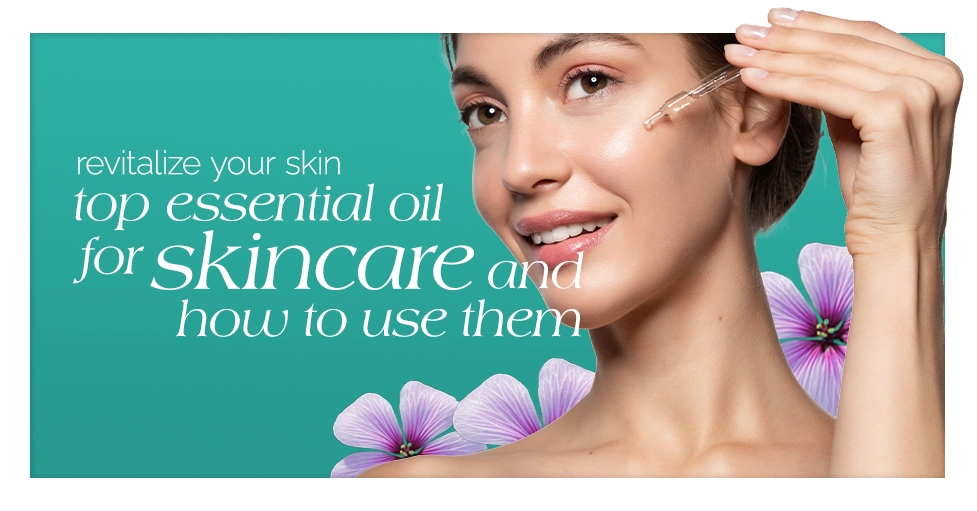
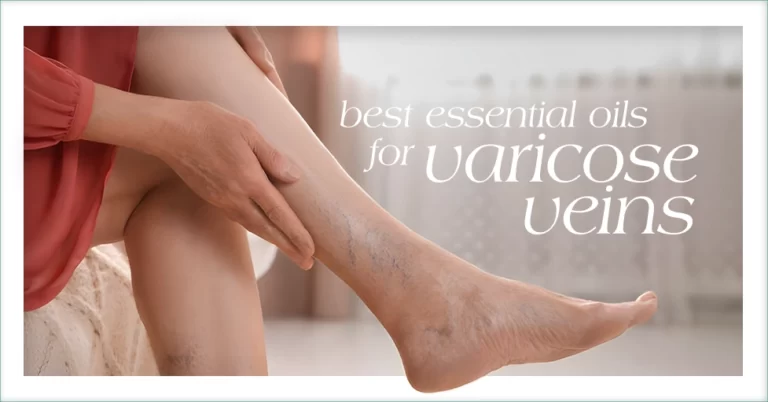
Thank you for the information.
Thanks for all this information
This is very helpful information! It’s nice to learn which oils can be used in skincare.
great tips! I need to try these
my face needs help
Nice. I will definitely use some of these!
Great article thankyou I will try this
Thanks for sharing
I never knew essential oils was used for skin
I never thought of Essential Oils for skin care
the lavender oil is the best and smells great
Lavender has many uses & I have discovered more here. Lavender has the most pleasant scent. I will share with my teens about ylang ylang which I had not heard of. Great information!
Thanks, now I know why my hand soap has Rose Geranium in it.
I think that essential oils are cool.
I like the LAVENDER ESSENTIAL OIL.
Good to know!
I use lavender for my skin
Maybe the Rose Geranium would help with my chronic flakey dry skin.
I like very much tea tree oil too. I use it for the whole house. But after reading this post, I want to try Ylang ylang! 😀 Thanks
Great for thought Thanks
Lots of good information Must try Rose Geranium
Love to mix Lavender, Rose Geranium and Ylang Ylang together
wow I had no idea this was great
Excellent I learned a lot thanks
Lavender is the best for healing
great information I had no idea
Thanks especially for including the safety tip!
I love your feed you always teach me something thanks
I could really use the Lavender 💜
Good to know!
Great tips! I will definitely be trying out the lavender and rose geranium in my skin care routine!
Love all these except for Ylang Ylang, great info.
Rose geranium sounds perfect for combination skin,some parts are dry some oily. Imagine one product for both that isn’t full of harsh chemicals!
Brilliant stuff
I love Lemongrass!! Had no idea that it was an effective treatment for acne. Thanks!!
good info
I only knew about chamomile, interesting to see the other ones
Thanx for this information. I like your blog because you give me a lot of usefull information about essential oils. Some of them are now for me.
Thanks so much. I am always looking for ways to switch up my skincare so that my skin stays clear.
Thank you very much.
Every new article from Organic Aromas has a poster to summarize the information with great detail.